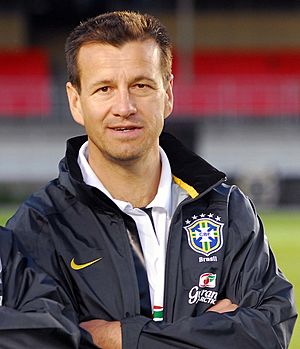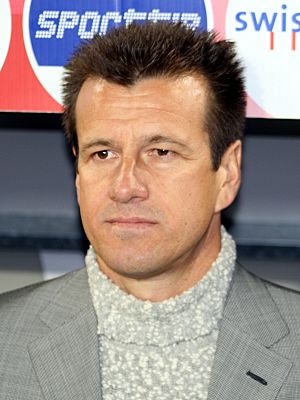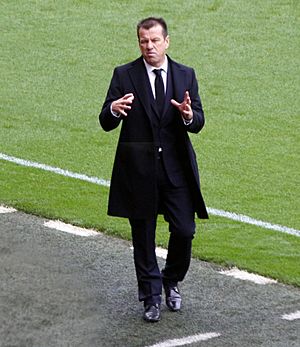Dunga facts for kids

Dunga with Brazil in 2008
|
||||||||||||||||||||||||||||||||||||||||||||||||||||||||||||||||||||||||||||||||||
| Personal information | ||||||||||||||||||||||||||||||||||||||||||||||||||||||||||||||||||||||||||||||||||
|---|---|---|---|---|---|---|---|---|---|---|---|---|---|---|---|---|---|---|---|---|---|---|---|---|---|---|---|---|---|---|---|---|---|---|---|---|---|---|---|---|---|---|---|---|---|---|---|---|---|---|---|---|---|---|---|---|---|---|---|---|---|---|---|---|---|---|---|---|---|---|---|---|---|---|---|---|---|---|---|---|---|---|
| Full name | Carlos Caetano Bledorn Verri | |||||||||||||||||||||||||||||||||||||||||||||||||||||||||||||||||||||||||||||||||
| Date of birth | 31 October 1963 | |||||||||||||||||||||||||||||||||||||||||||||||||||||||||||||||||||||||||||||||||
| Place of birth | Ijuí, Rio Grande do Sul, Brazil | |||||||||||||||||||||||||||||||||||||||||||||||||||||||||||||||||||||||||||||||||
| Height | 1.76 m (5 ft 9 in) | |||||||||||||||||||||||||||||||||||||||||||||||||||||||||||||||||||||||||||||||||
| Position(s) | Defensive midfielder | |||||||||||||||||||||||||||||||||||||||||||||||||||||||||||||||||||||||||||||||||
| Senior career* | ||||||||||||||||||||||||||||||||||||||||||||||||||||||||||||||||||||||||||||||||||
| Years | Team | Apps | (Gls) | |||||||||||||||||||||||||||||||||||||||||||||||||||||||||||||||||||||||||||||||
| 1980–1984 | Internacional | 10 | (0) | |||||||||||||||||||||||||||||||||||||||||||||||||||||||||||||||||||||||||||||||
| 1984–1985 | Corinthians | 13 | (1) | |||||||||||||||||||||||||||||||||||||||||||||||||||||||||||||||||||||||||||||||
| 1985–1987 | Santos | 16 | (1) | |||||||||||||||||||||||||||||||||||||||||||||||||||||||||||||||||||||||||||||||
| 1987 | Vasco da Gama | 17 | (1) | |||||||||||||||||||||||||||||||||||||||||||||||||||||||||||||||||||||||||||||||
| 1987–1988 | Pisa | 23 | (2) | |||||||||||||||||||||||||||||||||||||||||||||||||||||||||||||||||||||||||||||||
| 1988–1992 | Fiorentina | 124 | (8) | |||||||||||||||||||||||||||||||||||||||||||||||||||||||||||||||||||||||||||||||
| 1992–1993 | Pescara | 23 | (3) | |||||||||||||||||||||||||||||||||||||||||||||||||||||||||||||||||||||||||||||||
| 1993–1995 | VfB Stuttgart | 54 | (7) | |||||||||||||||||||||||||||||||||||||||||||||||||||||||||||||||||||||||||||||||
| 1995–1998 | Júbilo Iwata | 99 | (16) | |||||||||||||||||||||||||||||||||||||||||||||||||||||||||||||||||||||||||||||||
| 1999–2000 | Internacional | 20 | (3) | |||||||||||||||||||||||||||||||||||||||||||||||||||||||||||||||||||||||||||||||
| Total | 377 | (42) | ||||||||||||||||||||||||||||||||||||||||||||||||||||||||||||||||||||||||||||||||
| International career | ||||||||||||||||||||||||||||||||||||||||||||||||||||||||||||||||||||||||||||||||||
| 1983–1986 | Brazil Olympic | 19 | (4) | |||||||||||||||||||||||||||||||||||||||||||||||||||||||||||||||||||||||||||||||
| 1987–1998 | Brazil | 91 | (6) | |||||||||||||||||||||||||||||||||||||||||||||||||||||||||||||||||||||||||||||||
| Managerial career | ||||||||||||||||||||||||||||||||||||||||||||||||||||||||||||||||||||||||||||||||||
| 2006–2010 | Brazil | |||||||||||||||||||||||||||||||||||||||||||||||||||||||||||||||||||||||||||||||||
| 2008 | Brazil U23 | |||||||||||||||||||||||||||||||||||||||||||||||||||||||||||||||||||||||||||||||||
| 2012–2013 | Internacional | |||||||||||||||||||||||||||||||||||||||||||||||||||||||||||||||||||||||||||||||||
| 2014–2016 | Brazil | |||||||||||||||||||||||||||||||||||||||||||||||||||||||||||||||||||||||||||||||||
|
Medal record
|
||||||||||||||||||||||||||||||||||||||||||||||||||||||||||||||||||||||||||||||||||
| *Club domestic league appearances and goals | ||||||||||||||||||||||||||||||||||||||||||||||||||||||||||||||||||||||||||||||||||
Carlos Caetano Bledorn Verri (born October 31, 1963), known as Dunga, is a famous Brazilian football manager and former player. He was a talented defensive midfielder. Dunga was known for his great technique, strength, and accurate passes. He was also good at tackling and controlling the ball.
As captain, Dunga led the Brazilian team to win the 1994 FIFA World Cup. They also finished second in the next World Cup. Dunga is one of only two players to have played in a World Cup final, an Olympic final, a Confederations Cup final, and a continental championship final.
Dunga also coached the Brazilian national team two times. During his first time as coach, Brazil won the 2007 Copa América and the 2009 FIFA Confederations Cup. They also earned an Olympic bronze medal in Beijing 2008. His first coaching period ended after the team lost in the quarter-finals of the 2010 FIFA World Cup. He was appointed coach again in 2014 but was later dismissed. He also briefly coached Internacional in 2013.
Contents
Dunga's Early Life
Dunga was born in Ijuí, Rio Grande do Sul, Brazil. His family had roots in Italy and Germany. His uncle gave him the nickname "Dunga," which means "Dopey" in Portuguese. This was because he was small when he was a child. Even though he grew taller, the nickname stuck with him.
Playing Football
Club Career Highlights
Dunga played for many different clubs during his career. He played for Internacional (1980–84, 1999–2000), Corinthians (1984–85), and Santos (1985–87) in Brazil. He also played in Europe for clubs like Pisa (1987–88), Fiorentina (1988–92), Pescara (1992–93), and VfB Stuttgart (1993–95). Later, he played for Júbilo Iwata in Japan (1995–98).
International Career
Youth Team Success
Dunga started his international career in 1983. He was the captain of the Brazilian under-20 team. They won the FIFA U-20 World Cup by beating Argentina in the final. The next year, he was part of the Brazil squad that won a silver medal at the 1984 Summer Olympics.
Senior Team Achievements
Dunga first played for the senior Brazilian team in 1987. He helped Brazil win the 1989 Copa América at home. They beat Uruguay 2–0 in the final at the Maracanã Stadium.
Dunga was a key player for Brazil in the 1990 FIFA World Cup. After some challenges, Brazil's coach, Carlos Alberto Parreira, kept Dunga as a starter for the 1994 FIFA World Cup. Dunga was known for his strong defensive play in midfield. He was great at stopping opponents' attacks and then starting new ones with his accurate passes.
In the 1994 World Cup, Dunga became the team captain. He helped Brazil win the tournament. He set up a goal in a 3–0 win against Cameroon. In the final against Italy, the game ended 0–0. Dunga scored the third penalty kick in the shootout, helping Brazil win the World Cup! He completed the most passes and tackles in that World Cup.
Dunga remained captain until the 1998 FIFA World Cup. He helped Brazil win the 1997 Copa América. In the 1998 World Cup, Brazil reached the final but lost to France 3–0. This was Dunga's last game for the national team. He played 91 games for Brazil and scored six goals.
Coaching Career
Coaching Brazil
On July 24, 2006, Dunga became the new coach of the Brazil national team. He had no previous coaching experience at this level. However, he started well, winning four of his first five matches. His first game was a 1–1 draw against Norway. Brazil then beat Argentina 3–0 and Wales 2–0.
Dunga looked for talented players from many different clubs, not just the biggest ones. In 2007, Dunga led Brazil to win their second-straight Copa América title. They beat Argentina 3–0 in the final. Dunga's team also won the 2009 FIFA Confederations Cup in South Africa. They came back from being down 2–0 to beat the United States 3–2.
At the 2010 FIFA World Cup, Brazil reached the quarter-finals. They lost 2–1 to the Netherlands. After this, Dunga left his role as coach. Some people, including famous footballer Pelé, thought Dunga should have picked players like Neymar for the squad.
Coaching Internacional
On December 12, 2012, Dunga became the new coach of Internacional. This was the club where he started and ended his playing career. He was fired on October 3, 2013, after a series of losses.
Second Time Coaching Brazil
On July 22, 2014, Dunga returned to coach Brazil again. His first game back was a 1–0 win against Colombia. Brazil then had a winning streak, beating teams like Ecuador, Argentina, Japan, and France.
2015 Copa América Tournament
Brazil started the 2015 Copa América with a 2–1 win against Peru. They then lost 1–0 to Colombia and won 2–1 against Venezuela. In the knockout stage, Paraguay eliminated Brazil in a penalty shootout after a 1–1 draw. This meant Brazil did not qualify for the 2017 Confederations Cup.
Copa América Centenario Tournament
Brazil began the Copa América Centenario with a 0–0 draw against Ecuador. They then had a big 7–1 win over Haiti. However, Brazil lost 1–0 to Peru in a close game. This loss meant Brazil was eliminated from the tournament in the group stage for the first time since 1987. Dunga was fired by the Brazilian Football Confederation on June 14, 2016.
Dunga's Football Style
As a Player
As a player, Dunga was a strong and reliable defensive midfielder. He had good technique and was very good at winning the ball. He could read the game well and organize his teammates. Dunga was known for his ability to anticipate plays and time his tackles perfectly. He usually played in front of the defense, protecting his team's goal. He would win the ball and then quickly start attacks with his passes.
Dunga was also known for his powerful shots from far away and from free kicks. He had great vision and could make long passes to his forwards. He was a leader on the field and worked very hard. Even though he didn't play with as much flair as some other Brazilian players, his determination made him very successful.
As a Manager
When Dunga coached the Brazil national team, he used a balanced and practical approach. He focused on having a strong defense and using quick counter-attacks. His team would win the ball back and then use the speed of their forwards to score goals. He also used attacking players on the sides of the field to help with attacks.
Dunga was also known for being strict with his players. Some people criticized his coaching style because they felt the team played less exciting football. They also questioned his choices of players, as he sometimes left out talented attacking players like Ronaldinho and Neymar.
Career Statistics
Club Appearances and Goals
| Club | Season | League | National Cup | League Cup | Continental | Total | ||||||
|---|---|---|---|---|---|---|---|---|---|---|---|---|
| Division | Apps | Goals | Apps | Goals | Apps | Goals | Apps | Goals | Apps | Goals | ||
| Internacional | 1982 | Série A | 1 | 0 | 1 | 0 | ||||||
| 1983 | 4 | 0 | 4 | 0 | ||||||||
| 1984 | 5 | 0 | 5 | 0 | ||||||||
| Total | 10 | 0 | 10 | 0 | ||||||||
| Corinthians | 1985 | Série A | 13 | 1 | 13 | 1 | ||||||
| Santos | 1986 | Série A | 16 | 1 | 16 | 1 | ||||||
| Vasco da Gama | 1987 | Série A | 17 | 1 | 17 | 1 | ||||||
| Pisa | 1987–88 | Serie A | 23 | 2 | 6 | 1 | - | - | - | - | 29 | 3 |
| Fiorentina | 1988–89 | Serie A | 30 | 3 | 8 | 1 | - | - | - | - | 38 | 4 |
| 1989–90 | 28 | 0 | 2 | 1 | - | - | 11 | 0 | 41 | 1 | ||
| 1990–91 | 33 | 1 | 6 | 1 | - | - | - | - | 39 | 2 | ||
| 1991–92 | 33 | 4 | 4 | 1 | - | - | - | - | 37 | 5 | ||
| Total | 124 | 8 | 20 | 4 | 0 | 0 | 11 | 0 | 155 | 12 | ||
| Pescara | 1992–93 | Serie A | 23 | 3 | - | - | - | - | - | - | 23 | 3 |
| VfB Stuttgart | 1993–94 | Bundesliga | 27 | 4 | 27 | 4 | ||||||
| 1994–95 | 26 | 4 | 26 | 4 | ||||||||
| Total | 53 | 8 | 53 | 8 | ||||||||
| Júbilo Iwata | 1995 | J1 League | 25 | 1 | 2 | 0 | - | - | 27 | 1 | ||
| 1996 | 20 | 4 | 1 | 0 | 13 | 0 | - | 34 | 4 | |||
| 1997 | 26 | 5 | 0 | 0 | 11 | 1 | - | 37 | 6 | |||
| 1998 | 28 | 6 | 0 | 0 | 0 | 0 | - | 28 | 6 | |||
| Total | 99 | 16 | 3 | 0 | 24 | 1 | - | 126 | 17 | |||
| Internacional | 1999 | Série A | 15 | 1 | 15 | 1 | ||||||
| Career total | 393 | 41 | 29 | 5 | 24 | 1 | 11 | 0 | 457 | 47 | ||
International Appearances and Goals
| National team | Year | Apps | Goals |
|---|---|---|---|
| Brazil | 1987 | 4 | 1 |
| 1988 | 0 | 0 | |
| 1989 | 15 | 0 | |
| 1990 | 6 | 1 | |
| 1991 | 0 | 0 | |
| 1992 | 0 | 0 | |
| 1993 | 13 | 1 | |
| 1994 | 13 | 1 | |
| 1995 | 14 | 1 | |
| 1996 | 0 | 0 | |
| 1997 | 17 | 1 | |
| 1998 | 9 | 0 | |
| Total | 91 | 6 | |
- Scores and results list Brazil's goal tally first, score column indicates score after each Dunga goal.
| No. | Date | Venue | Opponent | Score | Result | Competition | Ref. |
|---|---|---|---|---|---|---|---|
| 1 | 1 June 1987 | Ramat Gan Stadium, Ramat Gan, Israel | 2–0 | 4–0 | Friendly | ||
| 2 | 13 May 1990 | Maracanã Stadium, Rio de Janeiro, Brazil | 3–1 | 3–3 | Friendly | ||
| 3 | 22 August 1993 | Estádio do Morumbi, São Paulo, Brazil | 2–0 | 2–0 | 1994 FIFA World Cup qualification | ||
| 4 | 8 June 1994 | San Diego Stadium, San Diego, United States | 7–2 | 8–2 | Friendly | ||
| 5 | 12 August 1995 | Suwon Stadium, Suwon, South Korea | 1–0 | 1–0 | Friendly | ||
| 6 | 19 June 1997 | Estadio Ramón Tahuichi Aguilera, Santa Cruz, Bolivia | 1–0 | 2–0 | 1997 Copa América |
Coaching Record
| Team | From | To | Record | ||||
|---|---|---|---|---|---|---|---|
| G | W | D | L | Win % | |||
| Brazil | 24 July 2006 | 2 July 2010 | 60 | 42 | 12 | 6 | 70.00 |
| Brazil Olympic Team | 22 June 2008 | 22 August 2008 | 9 | 8 | 0 | 1 | 88.89 |
| Internacional | 12 December 2012 | 26 October 2013 | 52 | 25 | 18 | 9 | 48.08 |
| Brazil | 22 July 2014 | 4 June 2016 | 26 | 18 | 5 | 3 | 69.23 |
| Total | 157 | 103 | 35 | 19 | 65.61 | ||
Honours and Awards
As a Player
Internacional
- Rio Grande do Sul State League: 1982, 1983, 1984
Vasco da Gama
- Rio de Janeiro State League: 1987
Júbilo Iwata
- J. League: 1997
Brazil U-20
- FIFA U-20 World Cup: 1983
- South American Youth Championship: 1983
Brazil
- FIFA World Cup: 1994
- FIFA Confederations Cup: 1997
- Copa América: 1989, 1997
- Olympic Silver Medal: 1984
- Pan American Games Silver Medal: 1983
- South American Pre-Olympic Tournament: 1984
Individual Awards
- World XI: 1990, 1991
- FIFA World Cup All-Star Team: 1994, 1998
- J. League Most Valuable Player: 1997
- J. League Best Eleven: 1997, 1998
- FIFA XI: 1997, 1998, 1999, 2000
- Venerdi's 100 Magnifici
- Golden Foot: 2010, as a football legend
- Fiorentina All-time XI
As a Manager
Internacional
- Rio Grande do Sul State League: 2013
Brazil
- Copa América: 2007
- Olympic Bronze Medal: 2008
- FIFA Confederations Cup: 2009
- Superclásico de las Américas: 2014
Individual Awards
- IFFHS World's Best National Coach: 2007
See also
 In Spanish: Dunga para niños List of Brazil national football team managers
In Spanish: Dunga para niños List of Brazil national football team managers
 | Georgia Louise Harris Brown |
 | Julian Abele |
 | Norma Merrick Sklarek |
 | William Sidney Pittman |



